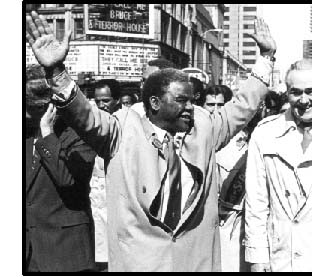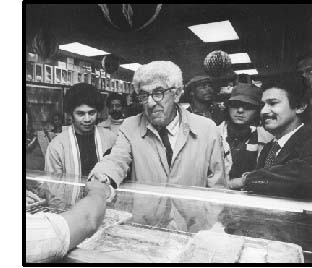

|

|

|

|
| |
 |
|||
|
Just about everyone agrees that there wasn't much to choose from in the recent presidential election. The dim bulb who spent more money than any candidate in history beat whom Chicago Tribune columnist Steve Chapman called the "most annoying person on the planet." But that doesn't mean nothing was at stake. A Republican in the White House, especially with a Republican Congress, is bad news for the well-being of the American people, as George W. Bush's cabinet appointments and announced priorities make clear. Fortunately, the amount of damage that this president can do is seriously compromised by his loss to Al Gore in the popular vote, the close division between the two parties in Congress, and the blatantly partisan 5-to-4 Supreme Court decision that ended the Florida recounts. If the Democrats learn the right lessons from this election, they could win clear control of both the House and Senate in 2002. Doing so would greatly enhance the influence of the Progressive and Black caucuses in the House, the two most important left presences in mainstream politics. A Gore presidency without a Democratic House would not have done so. The left can play a key role in winning back Congress, but doing so will require two things: a profound rethinking of the fiasco brought about last November by Ralph Nader and his supporters, and some courage by Democrats who shared Nader's policy views but failed to push Gore to advocate more progressive policies. First, let's look at Nader's aborted effort to influence the national policy debate: To
Nader's effect on the left, however, is another story. Instead of building a constituency for his ideas, as he claimed to be doing, Nader divided an already existing one and did a terrible disservice to progressives. Clearly, the constituency for Nader's ideas is much greater than his following. For every person who cast a vote for Nader, there were at least 10 who shared his views on many issues but voted Democratic. By dividing these progressives, Nader also diminished the left's influence in mainstream politics. He claimed that he was running to build a major movement in the electoral arena. Instead, the illusions he created by running on the line of a party cobbled together for the purpose of his transitory individualistic campaign succeeded only in leading his forces up a blind alley, where they may be lost for some time to come. The lesser problem here is the Green Party itself. This is not really a national party. In one form or another and in one state or another, Green parties have been around for more than 30 years, but they have little to show for it. In that time they have developed no coherent worldview, nor have they enjoyed any consistent organizational or political growth. Most of the party's few electoral victories have been in local nonpartisan contests--where party labels don't appear on the ballot--in white, middle-class, countercultural communities, mostly in New Mexico or Northern California. Nader himself is not even a Green Party member. His relationship with the Greens simply has been as a user of their ballot status. The more important issue, however, is the impact of episodic third-party efforts on the ability of the left to come in from the cold. Starkly put, third parties have been dead ends in the United States for almost a century. As I have argued before, despite the appeal of providing us with a political home of our own--and of making us feel righteous--third parties are not only a waste of time, effort and resources, but a formula for perpetual marginality. There are two reasons for this. First, a left third party is doomed to divide progressive social forces into hostile camps. In fact, Nader's campaign has already done so. Many who fought with Nader on the frontlines for the environment, consumer rights and other liberal causes now say he betrayed them by not withdrawing from the presidential race in time to save Gore's candidacy. In an interview with The Associated Press, Rep. John Conyers (D-Michigan), a stalwart congressional progressive who worked for many years with Nader on labor and regulatory issues, asked, "Who's going to work with him now?" Second, even if this does not happen, such campaigns would be counterproductive
The Republicans, of course, elected Abraham Lincoln and became the second major party on their second try. The Republicans succeeded because they came along at a time when the Whigs, one of the two major parties of its day, was fatally divided over the question of slavery's extension into the territories--an issue of vital national concern that split the nation in the 1850s. Only in such circumstances can a third party win national office. The Socialists ran five campaigns between 1900 and 1920 and were an important voice in American life until their breakup three years after the Russian Revolution. The Socialists, however, survived in a very different and more complex set of circumstances than we have now. And even they, a party with a solid national organization, more than 300 newspapers and magazines--including one with 750,000 subscribers--more than a hundred state legislators and thousands of elected municipal officials, could elect only two members of Congress. In the 20th century, a few prominent left-leaning politicians did run as third party candidates for president, but they did so as individuals and to make short-term points. Former President Theodore Roosevelt ran as a Progressive in 1912 because President Taft had deviated from Roosevelt's path, but his party quickly dissolved after the election. Sen. Robert La Follette ran as a Progressive in 1924, but he had no intention of starting a third party. Indeed, he explicitly forbade his followers from running candidates for any other offices, and after the election he returned to the Republican Party. Similarly, former Vice President Henry A. Wallace ran on a peace platform as a Progressive in 1948, but that campaign only facilitated the further isolation of the left. And finally, in 1980, environmentalist Barry Commoner led an attempt to start a Citizens Party. Ignored by the media and the public, his effort fizzled. The structure of our political system is the main reason for the limitations of such efforts. In a parliamentary system where the members of parliament select the prime minister as head of government--especially in countries with proportional representation--electing minor party legislators makes sense. Countries that have one or both of these systems frequently elect minor party members to parliament. And when they represent the balance of power between two major parties, they participate in ruling coalitions. The Greens have done this in Germany, as have the Communists in France. But in a system like ours, where the president is elected separately by nationwide votes and members of Congress are elected in single-member districts, only two parties can survive. It is true that in the late 19th century, when Democratic and Republican party bosses simply locked out reformers, third parties were often the only path open to working people's reform movements. But when they had a measure of success, as the Populists did in the early 1890s, their demands were adopted by one of the major parties. Thus, in 1896, the Populists merged with the Democrats in support of William Jennings Bryan. But even this form of third party became unnecessary when progressive reformers pushed through direct primary laws in the early 1900s. Since then our political parties have no longer been inaccessible to the public. In fact, as quasi-state institutions they are no longer political parties in the European parliamentary sense. The Republican and Democratic parties are legally regulated structures with fixed times and places where anyone can register. Open to all, they have no ideological requirements for membership. To become a Republican or Democrat, you just register as such. In fact, these are not really parties at all, but coalitions of more or less compatible social forces in which various groups contest for influence under a common banner. Of course, it is still difficult for any individual or group to succeed in this process without lots of money. But organized groups with clear programmatic ideas and a long-term commitment can become forces within either party. The left seems unable to understand this, but the Christian right had no such trouble in the 1980s. A small minority, they entered the Republican Party as an organized force and backed compatible candidates, or ran their own, for local, state and national office. They knew what they wanted, organized to get it, and gained great influence during the Reagan and (papa) Bush years. Something similar occurred on the left inside the Democratic Party in Chicago when Harold Washington was elected mayor. Washington, a lifelong Democrat, always talked about Chicago's two parties--but he didn't mean the Democrats and the Republicans. To him, it was his party versus little Richie Daley's. Unfortunately, his movement had barely begun to cohere when he died early in his second term. Or consider Jesse Jackson: Acting largely as an individual, he ran twice in the Democratic presidential primaries. He participated in all the televised debates, consistently outshone his rivals and, in 1988, got 7 million votes. This success won him a prime-time speaking slot at that year's Democratic National Convention, where he made the meeting's most enthusiastically received speech. As a result, Jackson's ideas gained wide public exposure, and the African-American community greatly enhanced its national political visibility. Like Nader, Jackson started at the top and was pretty much a one-man show. And like Nader, Jackson did not devote himself to building a movement after the election. Even so, Jackson, Washington and the Christian Coalition validate the principle of working within the existing institutional parameters of the American political system. These examples--rather than 11th-hour third-party campaigns that end up as moralistic exercises in futility--point the way to a strategy that might allow us to become a recognized force in the nation's political life. Now that Gore lost, the usual vultures are already plucking at his carcass. Al From, president of the Democratic Leadership Council, has led the way in calling for Democrats to move even closer to the center. Instead of following Clinton's example of advocating smaller government, From claims, Gore made a fatal error by running a populist campaign. But From has it backward. Gore did best when posed as an advocate of working people--as he did at the Democratic Convention--and worst when he failed to follow through with anything of substance on major issues like campaign finance reform, universal health care, a higher minimum wage and government support of public education at all academic levels. So how could the left could play a significant role in fighting for these and other causes within mainstream institutions? First, the left needs to champion a set of principles that has all but disappeared from mainstream public life. Today, all but a tiny number of public figures, liberal as well as conservative, and all commercial media share the implicit premise that the public good is best served by protecting and enhancing corporate profit. This deification of a mythical free market, even when unspoken, reigns supreme in policy-making circles and is rarely, if ever, challenged in the public arena. We must build a national movement that puts working people's needs first, explicitly as well as implicitly. Emphasis on particular issues may vary widely, but the positions we take should be based on the universal social principle of putting human need above corporate profitability. This principle should always be claimed as the distinguishing line between progressive and conservative policy. Second, because it is based on universalizing principle, building such a movement requires a commitment to electoral activity year-in and year-out. Single-issue or interest movements--unions, environmentalists, civil rights, public health--can and do function effectively as lobbyists within the corporate ideological framework, but only rarely can such interest groups win and hold public office based on their particular issues or interests. But to learn how to unite people across lines of parochial interest, it is necessary to run for public office. That is the only way to bring and hold together a unified constituency committed to universal principles. Third, success or the possibility of success in the near future is essential. That requires the careful selection of an arena appropriate to one's forces and goals. In national politics, it seems clear that the place to start is not the presidential level, but at the congressional district level. There are several reasons for this. Presidential politics is dormant for three out of every four years. Engaging in campaigns like Nader's entails a start-and-stop politics that leads only to wasted effort and disappointment. Both Commoner in 1980 and Nader last year insisted that they were starting long-term movements, but both efforts collapsed almost immediately after the election. Part of the problem with this style of politics interruptus is that starting at the top requires a focus on a nationally recognized leader--someone like Jackson or Nader. In contrast, winning a congressional primary simply requires sustained organization, a clear program and a locally attractive candidate. In many cases a congressional primary is the real election, and winning one requires only half as many votes as the general election--because only 20 to 25 percent of the electorate bothers to vote in primaries. Thus a concentrated effort by a group of dedicated people working at the grassroots level--in the manner of the Christian Coalition--can win a major-party nomination for Congress relatively easily. Two or three such victories by a such a group within the Democratic Party would put us on the national political map and inspire others to follow suit. Such a progressive coalition could and should espouse many causes. Consider a few examples: • Campaign finance reform: True democracy requires equal access to the electoral process and to information about the principles and programs of the candidates running for office. Although the airwaves belong to the public, they are controlled by profit-making corporations and therefore only accessible to the wealthy. The idea that the American people own the airwaves and should control their use is easy to grasp. And the advantage to democracy of a system in which broadcasters were required, as a condition of their licenses, to provide free chunks of time to all qualified candidates is obvious. Providing substantial blocks of time would not only level the playing field of politics, but it would force candidates to explain themselves to the voters in some depth. Instead of using the 30-second sound bites that now dominate the airwaves and confuse potential voters, candidates would be able to have serious discussions. Such a reform would go a long way toward reducing the gap in political power between the wealthy and working people. • Health care: We should espouse the universal right to high quality health care through a system focused on patients' needs and doctors' decisions rather than insurance company profits. The least bureaucratic system that meets this requirement is the single-payer plan that now enjoys strong popular support in Canada. Under a single-payer system, the money would come from the federal government and be administered by the states, which would pay doctors on a case-by-case basis. Corporate middlemen would no longer have to approve treatment and the enormous waste involved in HMO and insurance company bureaucracies would be eliminated. • Drugs: The United States now has the highest per capita prison population in the world, and half of those in prison are there for drug-related crimes. This has taken a brutally heavy toll on African-American and Hispanic youth. Yet after decades of the war on drugs, drug use has not been reduced significantly. Several recent state referenda designed to loosen the laws against marijuana use indicate that the public is ready for a campaign to decriminalize drugs and to treat addiction as a medical problem. • Education: We should demand that all primary and secondary schools provide full programs of extracurricular activities, which have been shown to improve academic performance. Investment in education for this purpose would also require equal per capita funding, as well as more teachers and smaller class sizes. Such a program should also include equal access to colleges and universities. The way to end hostility over affirmative action is to guarantee access to all who want a higher education. That, too, will require increased federal funding for state college and university systems. • The military: The military budget should be cut to reflect the level needed to defend the nation against external threat, rather than the demands of military contractors and arms merchants and their servants in Congress. Given the incredibly high level of corruption caused by lobbyists for the military-industrial complex, nationalization of the arms industry should also be considered. If the government removed the profit motive from arms manufacturing, the corruption of Congress by money from the armaments industry would also end and money for social programs would become available without incurring large deficits. • Free trade: Trade pacts should require both sides to guarantee workers rights and to protect the environment. Opposition to Clinton-style globalization has already created one of the major social movements of recent decades and is a key concern of environmentalists, labor and other key constituencies who put human need above the profit-driven priorities of international capital. There are many other issues that could be added based on this universal principle of putting human needs above corporate profits. These include increased progressivity in the tax code, a substantial increase in the minimum wage, and strengthening the right to organize unions. But this is a start on what progressives might think about this year and prepare to campaign on next year. We will need to flesh out these ideas and translate them into specific
legislative proposals, but meanwhile we should be looking for six
or seven House seats in swing districts or districts with a conservative
Democrat who should be challenged in the primaries. Let's pick out
some districts and find a local trade unionist, public health care
leader, environmentalist or educator who has a following and take
the plunge. If we do this, we might be well on the road to creating
a meaningful left in our political culture.
|


